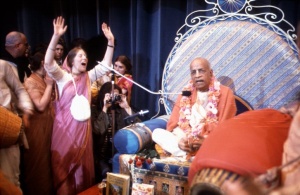CC Madhya 21.107 (1975): Difference between revisions
(Vanibot #0027: CCMirror - Mirror CC's 1996 edition to form a basis for 1975) |
(Vanibot #0020: VersionCompareLinker - added a link to the Version Compare feature) |
||
| Line 2: | Line 2: | ||
<div style="float:left">'''[[Sri Caitanya-caritamrta (1975)|Śrī Caitanya-caritāmṛta (1975)]] - [[CC Madhya (1975)|Madhya-līlā]] - [[CC Madhya 21 (1975)|Chapter 21: The Opulence and Sweetness of Lord Śrī Kṛṣṇa]]'''</div> | <div style="float:left">'''[[Sri Caitanya-caritamrta (1975)|Śrī Caitanya-caritāmṛta (1975)]] - [[CC Madhya (1975)|Madhya-līlā]] - [[CC Madhya 21 (1975)|Chapter 21: The Opulence and Sweetness of Lord Śrī Kṛṣṇa]]'''</div> | ||
<div style="float:right">[[File:Go-previous.png|link=CC Madhya 21.106 (1975)|Madhya-līlā 21.106]] '''[[CC Madhya 21.106 (1975)|Madhya-līlā 21.106]] - [[CC Madhya 21.108 (1975)|Madhya-līlā 21.108]]''' [[File:Go-next.png|link=CC Madhya 21.108 (1975)|Madhya-līlā 21.108]]</div> | <div style="float:right">[[File:Go-previous.png|link=CC Madhya 21.106 (1975)|Madhya-līlā 21.106]] '''[[CC Madhya 21.106 (1975)|Madhya-līlā 21.106]] - [[CC Madhya 21.108 (1975)|Madhya-līlā 21.108]]''' [[File:Go-next.png|link=CC Madhya 21.108 (1975)|Madhya-līlā 21.108]]</div> | ||
{{CompareVersions|CC|Madhya 21.107|CC 1975|CC 1996}} | |||
{{RandomImage}} | {{RandomImage}} | ||
==== TEXT 107 ==== | ==== TEXT 107 ==== | ||
<div class="verse"> | <div class="verse"> | ||
: | :caḍi' gopī-manorathe, manmathera mana mathe, | ||
:nāma dhare | :nāma dhare 'madana-mohana' | ||
: | :jini' pañcaśara-darpa, svayaṁ nava-kandarpa, | ||
:rāsa kare lañā gopī-gaṇa | :rāsa kare lañā gopī-gaṇa | ||
</div> | </div> | ||
| Line 20: | Line 19: | ||
<div class="synonyms"> | <div class="synonyms"> | ||
caḍi'—riding; gopī-manaḥ-rathe—on the chariot of the minds of the gopīs; manmathera—of Cupid; mana—the mind; mathe—churns; nāma—the name; dhare—accepts; madana-mohana—Madana-mohana, the deluder of Cupid; jini'-conquering; pañca-śara—of Cupid, the master of the five arrows of the senses; darpa—the pride; svayam—personally; nava—new; kandarpa—Cupid; rāsa—rāsa dance; kare—performs; lañā—with; gopī-gaṇa—the gopīs. | |||
</div> | </div> | ||
| Line 27: | Line 26: | ||
<div class="translation"> | <div class="translation"> | ||
"Favoring them, Kṛṣṇa rides on the chariot of the minds of the gopīs, and just to receive loving service from them, He attracts their minds like Cupid. Therefore He is also called Madana-mohana, the attractor of Cupid. Cupid has five arrows, representing form, taste, smell, sound and touch. Kṛṣṇa is the owner of these five arrows, and with His Cupid-like beauty, He conquers the minds of the gopīs, though they are very proud of their superexcellent beauty. Becoming a new Cupid, Kṛṣṇa attracts their minds and engages in the rāsa dance. | |||
</div> | </div> | ||
Latest revision as of 13:43, 27 January 2020

A.C. Bhaktivedanta Swami Prabhupada
TEXT 107
- caḍi' gopī-manorathe, manmathera mana mathe,
- nāma dhare 'madana-mohana'
- jini' pañcaśara-darpa, svayaṁ nava-kandarpa,
- rāsa kare lañā gopī-gaṇa
SYNONYMS
caḍi'—riding; gopī-manaḥ-rathe—on the chariot of the minds of the gopīs; manmathera—of Cupid; mana—the mind; mathe—churns; nāma—the name; dhare—accepts; madana-mohana—Madana-mohana, the deluder of Cupid; jini'-conquering; pañca-śara—of Cupid, the master of the five arrows of the senses; darpa—the pride; svayam—personally; nava—new; kandarpa—Cupid; rāsa—rāsa dance; kare—performs; lañā—with; gopī-gaṇa—the gopīs.
TRANSLATION
"Favoring them, Kṛṣṇa rides on the chariot of the minds of the gopīs, and just to receive loving service from them, He attracts their minds like Cupid. Therefore He is also called Madana-mohana, the attractor of Cupid. Cupid has five arrows, representing form, taste, smell, sound and touch. Kṛṣṇa is the owner of these five arrows, and with His Cupid-like beauty, He conquers the minds of the gopīs, though they are very proud of their superexcellent beauty. Becoming a new Cupid, Kṛṣṇa attracts their minds and engages in the rāsa dance.